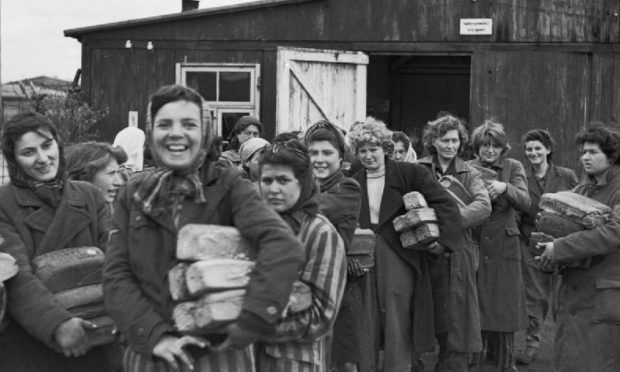A Holocaust survivor says the coronavirus pandemic might help remind the world “people are people” and slow the rise of populism.
Speaking on the 75th anniversary of the liberation of the Bergen-Belsen concentration camp in northern Germany, Anita Lasker-Wallfisch said Covid- 19 “might wake people up to have better attitudes towards each other”.
The first camp to be liberated by British troops, the horror of Belsen was on such a scale the BBC initially refused to broadcast the full report by journalist Richard Dimbleby for fear of distressing listeners.
The broadcaster, father of Jonathan and David, said he had “passed through the barrier and found myself in the world of nightmare”.
Describing one prisoner, he said: “She was a living skeleton, impossible to gauge her age for she had practically no hair left, and her face was only a yellow parchment sheet with two holes in it for eyes.”
Footage of the piles of emaciated bodies left outside the camp’s wooden huts soon followed Dimbleby’s report, revealing to the British public for the first time the reality of the Nazis’ “final solution”.
It is estimated 50,000 people died at the camp under Nazi rule, and a further 14,000 of the 60,000 living prisoners found by the British were so frail they perished in the weeks after liberation.
Diarist Anne Frank and her sister Margot are among the camp’s most famous victims – believed to have died between February and March 1945 from typhus.
Mrs Lasker-Wallfisch, now 94, was an inmate at Auschwitz before being crammed on a train to Belsen with 3,000 others as the Red Army marched on the notorious extermination camp.
When asked, with populism on the rise, the world might be in danger of forgetting the lessons of the holocaust, she said: “Of course, we are all worried, but we are worried about something else now.
“We are worried about coronavirus and maybe the end result of this disaster, which is a world disaster, might wake people up to have better attitudes towards each other.”
She added: “Maybe with what is happening now in the world where everyone is affected, maybe people will wake up and realise that people are people – human beings.”
Events to mark this year’s anniversary were cancelled due to the pandemic, but the Holocaust Educational Trust (HET) and many other charities are working hard to keep alive the memory of what happened.
Karen Pollock, HET chief executive, said populist movements seen in countries like Hungary and Poland and their attempts to rewrite the history of the Holocaust “just makes our work more important”.
She added: “I’m proud of the fact we have got generations of young people today who feel quite strongly that it is their job not just to carry the legacy of the survivors, not just to remember that it happened – but also to protect the truth of the Holocaust.”


